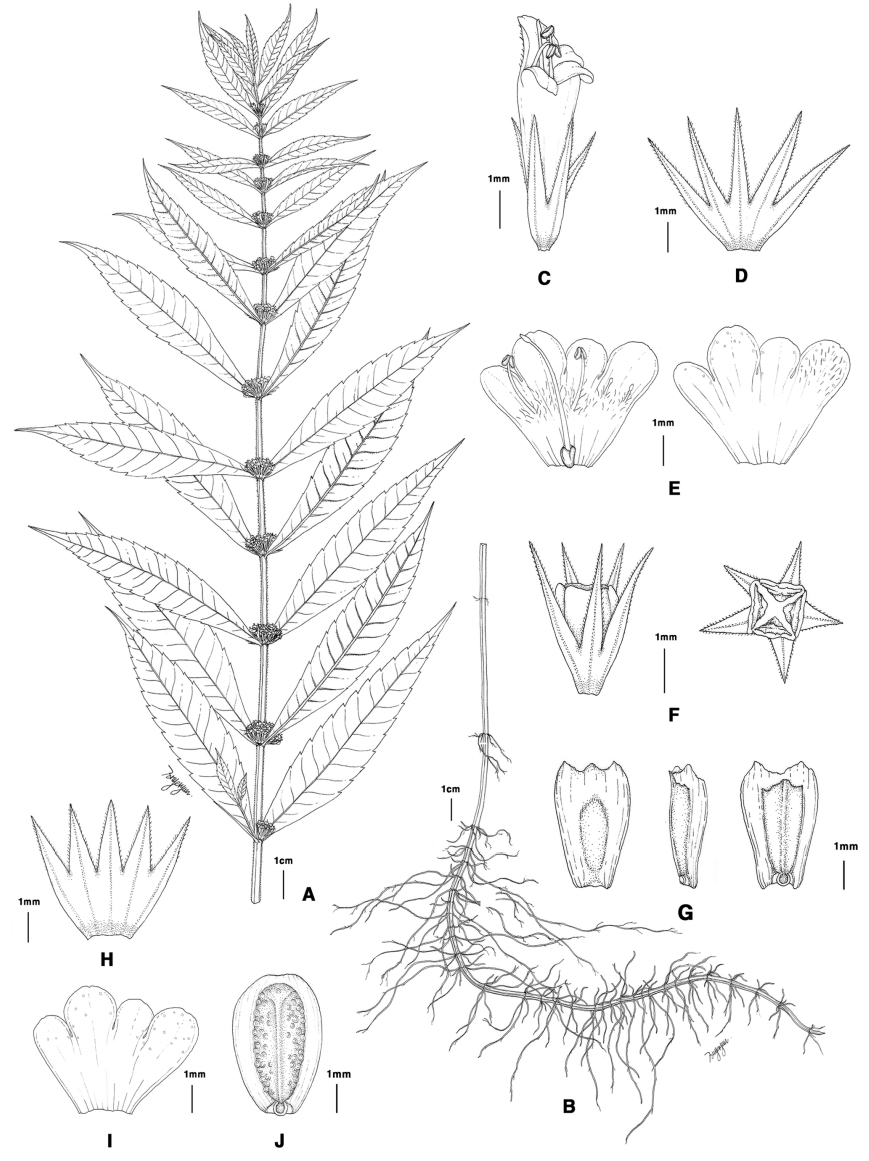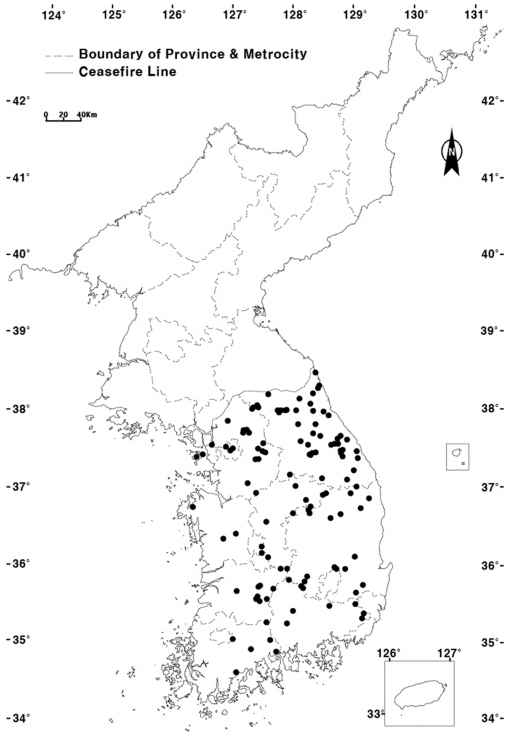한국 미기록 식물 산쉽싸리(꿀풀과)
A new record of Lycopus charkeviczii Prob. (Lamiaceae) in Korea
Article information
Abstract
꿀풀과의 Lycopus charkeviczii Prob.가 제주도를 제외한 전국에서 발견되었다. 본 종은 소견과보다 긴 숙존하는 악편, 좁은 피침형에서 장타원상 피침형인 잎과 같은 공유 형질을 가지고 있어 쉽싸리(L. lucidus)와 유사하다. 그러나 심열하는 악, 상부는 불규칙한 파상이며 선점이 없거나 드물게 있는 소견과인 특징으로 뚜렷이 구분된다. 국명은 생육지를 고려하여 ‘산쉽싸리’로 신칭하였고, 이에 대한 기재, 도해, 사진 및 검색표를 제시하였다.
Trans Abstract
Lycopus charkeviczii Prob. (Lamiaceae Martinov) is found in all provinces of the Korean Peninsula, excluding Jeju-do. This species is closely related to L. lucidus Turcz. ex Benth., having such characters as persistent calyx of which the length is longer than the nutlets, and narrowly lanceolate to oblong-lanceolate leaves. However, it is distinguished from L. lucidus by its parted calyx and its smooth or rarely glandular nutlets with an irregularly toothed apex. This taxon was named ‘San-swip-ssa-ri’ in Korean based on its habitat. We provide a description, illustrations, photographs, and a key of related taxa in Korea.
쉽싸리속(Lycopus L.)은 꿀풀과(family Lamiaceae) 개박하아과(subfam. Nepetoideae)의 박하족(tribe Mentheae)에 속하며, 북반구 온대지역을 중심으로 약 15분류군이 분포하는 것으로 알려져 있다(Henderson, 1962; Harley et al., 2004). 본 속은 포복경 또는 괴경이 발달하는 다년생 초본, 거치와 선점이 있으며 대생하는 잎, 종모양의 악, 흰색의 화관, 2개의 수술, 털이 없는 수술대, 화관 밖으로 돌출된 약, 4개로 깊게 갈라진 자방, 도란형이며 4면체인 소견과 등의 형태적 특징들로 과내 다른 속들과 구별된다(Henderson, 1962; Harley et al., 2004; Moon and Hong, 2006).
쉽싸리속에 대한 연구는 형태, 해부, 화분 및 분자생물학적 연구들에서 형태적 차이 및 각 분류군들의 유연관계에 대한 논의가 주로 이루어졌으며(Moon et al., 2008; Moon et al., 2009a, 2009b, 2010,; Ryding, 2010; Drew and Sytsma, 2011), Harley et al. (2004)에 의한 최신 분류체계에 의하면 박하아족[subtribe Menthinae (Dumort.) Endl.]에 속한다. 그러나 Drew and Sytsma (2012)는 쉽싸리속 한 속만을 포함하여 쉽싸리아족(subtribe Lycopinae)으로 승격시킨 바 있다.
한국산 쉽싸리속은 Moon (2003)에 의해 쉽싸리(L. lucidus Turcz. ex Benth.), 애기쉽싸리[L. maackianus (Maxim. ex Herder) Makino], 개쉽싸리[L. ramosissimus (Makino) Makino] 및 털쉽싸리(L. uniflorus Michx.)의 총 4분류군이 알려져 있다. 이후 Moon et al. (2013)은 쉽싸리의 변종인 큰쉽싸리(L. lucidus var. hirtus Regel)를 한국 미기록 식물로 보고하였고, 개쉽싸리의 학명을 L. cavaleriei H. Lév.로 변경한 바 있다.
본 연구는 국립수목원의 연구과제 수행 및 산림생물표본관(KH)의 표본 재동정 과정에서 발견된 쉽싸리속의 미기록 식물인 L. charkeviczii Prob.가 제주도를 제외한 전국에 자생하고 있는 것이 확인됨에 따라 이에 대한 형태를 기재하고, 국명과 분포를 보고하는데 그 목적이 있으며, 근연 분류군들을 검토하여 이들과의 검색표를 제시하였다.
분류군의 기재
Lycopus charkeviczii Prob., Sosud. Rast. Sovet. Dal'nego Vostoka 7: 351, 1995. (Figs. 1, 2)−−TYPE: Russia, Prov. Primorskiy, Nahodka city, 7 Aug. 1988, S. S. Charkevicz and T. G. Bucz s. n. (holotype, VLA, not seen).

Photographs of Lycopus charkeviczii Prob. A. Habit; B. Rhizome; C. Stem; D. Leaf (a. adaxial surface; b. abaxial surface); E. Flower; F. Nutlets; G. Seed.

Illustrations of Lycopus charkeviczii Prob. and L. lucidus Turcz. ex Benth. A−G. L. charkeviczii (A. Distal portion of flowering plant; B. Proximal portion of plant; C. Flower; D. Calyx; E. Collora; F. Nutlet; G. Seed); H−J. L. lucidus (H. Calyx; I. Collora; J. Seed).
Herbs perennial, 40−160 cm tall. Rhizomes nodose, creeping; stolons several, rooting at nodes, leafless. Stems erect, simple or usually branched, quadrangular, glabrescent or sparsely pubescent; nodes purple-red, pubescent. Leaves opposite, green, chartaceous; petiole obscure, 2−7 mm long or sessile; blade narrowly lanceolate to oblong-lanceolate, 7−17 cm long, 2−4 cm wide, acuminate or acute at apex, attenuate at base, semiamplexicaul, acute-serrate at margin, adaxially glabrous or sparingly pubescent, abaxially sparsely pubescent on nerves and glandular dotted. Inflorescence verticillaster, globose, 1.0−1.5 cm in diameter, crowded in middle to upper leaf axils; bracteoles linear-lanceolate to lanceolate, 2.5−7.0 mm long, aristate-acuminate at apex, glabrous. Calyx companulate, 3.0−5.5 mm long, glandular dotted, deeply 5-lobed at apex; lobes lanceolate, 1.5−5.0 mm long, spinescent at apex, ciliolate. Corolla tubular-campanulate, white, 3.4−7.5 mm long, glandular dotted outside; throat white pubescent inside; limb indistinctly bilabiate; upper lip subcircular, 1.5−5.5 mm long, emarginate, pubescent outside; lower lip 3-lobed, orbicular, middle lobe larger. Stamens 2, anterior, fertile, 2.5−4.2 mm long, scarcely exserted; staminodes 2, posterior, linear, clavate or capitate at apex; filaments filiform, glabrous; anther 2-locule, elliptical, parallel. Pistil 1; ovary 4-locule; style gynobasic, 3.1−6.2 mm long, exserted, 2-cleft at apex; lobes flattened. Nutlets obovoid, 2.3−3.0 mm long, 1.0−1.5 mm wide, angled, irregular undulate at apex, subattenuate at base, adaxially glabrous, balckish brown.
Korean name: San-swip-ssa-ri (산쉽싸리).
Flowering: Aug. to Oct.
Distribution: Russia (Primorskiy), Korea.
Korea: All province except Jeju-do.
Specimens examined: Appendix.
논의: 본 종은 러시아 Primorskiy 지역에서 채집된 표본(S. S. Charkevicz and T. G. Bucz s. n., VLA)을 기준으로 쉽싸리(L. lucidus)와 달리 잎은 수평으로 퍼지고 산지에 생육하는 특징에 의해 신종 발표되었다(Probatova, 1995). 국립수목원 산림생물표본관에 소장된 산쉽싸리 표본은 대부분 쉽싸리로 동정되어 있었다. 이는 두 종이 외부형태학적으로 매우 유사하고, 습지에서 자라는 생육적 특징을 공유하기 때문에 각 분류군에 대한 명확한 식별형질을 인식하지 못한 결과로 판단된다. 산쉽싸리는 산지의 습지에 생육하고, 대체로 비후되지 않는 지하경을 가지고 있어, 저지대의 양지바른 습지에 생육하고, 흔히 줄기보다 두껍게 비후된 지하경을 가지는 쉽싸리와 어느 정도 식별이 가능하다(Fig. 1). 또한 산쉽싸리는 2/3정도 갈라지는 악, 상부는 불규칙한 파상이며 향축면에 선점이 없거나 드물게 있는 소견과를 가져 쉽싸리 및 큰쉽싸리와 뚜렷이 구분된다(Figs. 1, 2). 국명은 생육지를 고려하여 ‘산쉽싸리’로 신칭하였다. 산쉽싸리는 한국 이외에도 러시아 연해주(Primorskiy) 남부지역에도 분포하는 것으로 알려져 있다(Fig. 3; Probatova, 1995). 한국과 러시아의 분포를 감안하면 북한과 중국 길림성 지역에도 산쉽싸리가 분포할 것으로 판단된다.
한국산 쉽싸리속(Lycopus L.)의 종 검색표
1. 지하경에 괴경이 있다; 소견과는 숙존된 악편보다 길다 ······························································· 털쉽싸리 L. uniflorus
1. 지하경에 괴경이 없다; 소견과는 숙존된 악편보다 짧다.
2. 잎은 마름모상 타원형이고 상부는 아둔두이며 가장자리는 둔거치이다 ·················· 개쉽싸리 L. cavaleriei
2. 잎은 좁은 피침형에서 장타원상 피침형이고 상부는 예두 또는 점첨두이며 가장자리는 예거치이다.
3. 줄기 중앙의 잎은 길이 2.5−6 cm이고 엽저는 둔저 또는 원저이다; 악통은 길이 2−2.5 mm이다 ····················································· 애기쉽싸리 L. maackianus
3. 줄기 중앙의 잎은 길이 7−17 cm이고 엽저는 유저상 예저이다; 악통은 길이 3−5.5 mm이다
4. 악은 전체 길이의 1/2정도까지 갈라지고 열편은 삼각상 난형이다; 화관 상순의 표면에는 선점이 있다; 소견과의 상부는 원두이고 향축면에는 선점이 있다.
5. 잎과 줄기는 무모이다 ······ 쉽싸리 L. lucidus
5. 잎과 줄기는 유모이다 ······························································ 큰쉽싸리 L. lucidus var. hirtus
4. 악은 전체 길이의 2/3정도까지 갈라지고 열편은 피침형이다; 화관 상순의 표면에는 선점과 털이 있다; 소견과의 상부는 불규칙한 파상이고 향축면에는 선점이 없거나 드물게 있다 ················································ 산쉽싸리 L. charkeviczii
Acknowledgements
본 논문은 국립수목원 한반도 미확인 자생식물명 연구과제(KNA-1-16, 15-1)의 일환으로 수행되었습니다. 도해를 맡아주신 조혜련 선생님께 감사드립니다.
